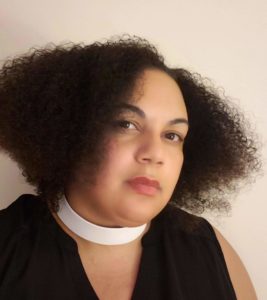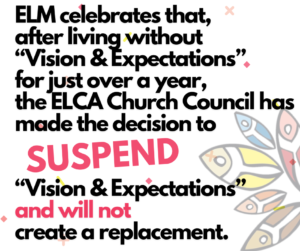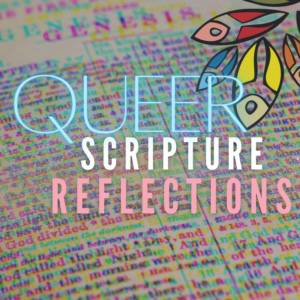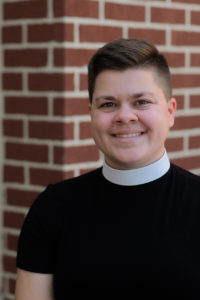para leer esta declaración en español, haga clic aquí:
ELM Board Statement Regarding Bishop Rohrer
para leer esta declaración en español, haga clic aquí:


 The Rev. Carla Christopher Wilson (she/her/hers) is Assistant to the Bishop in Charge of Justice Ministries for Lower Susquehanna Synod and Associate Pastor of Faith Formation and Outreach for Lutheran Church of the Good Shepherd in Lancaster, Pennsylvania. CarlaChristopher.Com and @RevCarlaChristopher on Facebook or @Rev.CarlaChristopher on Instagram.
The Rev. Carla Christopher Wilson (she/her/hers) is Assistant to the Bishop in Charge of Justice Ministries for Lower Susquehanna Synod and Associate Pastor of Faith Formation and Outreach for Lutheran Church of the Good Shepherd in Lancaster, Pennsylvania. CarlaChristopher.Com and @RevCarlaChristopher on Facebook or @Rev.CarlaChristopher on Instagram.
The year 1990 brought us the creation of the World Wide Web, the launch of the Hubble telescope, the release of Nelson Mandela after 27 years in prison, and it was also the year of the reunification of Germany when the Berlin Wall came down. 1990 was also the year when the wall known as “Vision & Expectations” was built into the newly created Evangelical Lutheran Church in America’s candidacy process barring publicly-out LGBTQIA+ individuals from serving the church. Over 31 years later, we celebrate, this wall, too, has finally come down.
Earlier this month, the ELCA Church Council “suspended consideration of an aspirational document to replace ‘Vision and Expectations’ until the need arises to develop such a document” ending an almost three-year review process.
“I thank God that V&E is gone!” Pastor Christina Montgomery (she/her) proclaimed when she heard the news. “That singular document forced so many brilliant LGBTQIA+ people to choose between answering God’s call to ministry and living their authentic embodied truth as God created them. It is my prayer that the ELCA continues to leap forward in its understanding of the gospel and reflect the radically inclusive love of Christ in all of its governing documents.”
 ELM celebrates that, after living without “Vision & Expectations” for just over a year, the ELCA Church Council has made the decision to suspend “Vision & Expectations” and will not create a replacement (see background section below).
ELM celebrates that, after living without “Vision & Expectations” for just over a year, the ELCA Church Council has made the decision to suspend “Vision & Expectations” and will not create a replacement (see background section below).
“We are ever closer to a time when queer leaders can enter into candidacy as the called and faithful servants that God created them to be without having to justify — to themselves or candidacy committees — that their sexual and gender identities are holy and are gifts for ministry in this Church,” commented ELM Executive Director, the Rev. Amanda Gerken-Nelson (she/her). “Removing ‘Vision & Expectations’ is a monumental moment for our community.”
It is important to acknowledge that there continue to be pillars of discrimination and barriers to full-participation that permeate our Church — for example, “Bound Conscience” in the 2009 human sexuality statement “Gift & Trust.” White supremacy, trans- and queer-phobia, and ableism continue to plague our communities and congregations. While ELM believes progress has been made, we also fear that the church could slide backward on the arc of justice if the “need…to develop such a (new) document” is determined solely by those who have historically held positions of power and privilege in the Church.
ELM will continue to advocate in ELCA rooms of power for the most marginalized in our midst — just as it did for the abolishment of “Vision & Expectations.” There is still a great amount of ministry yet to do!
For thousands of years, the church has obsessively created rules regarding human sexuality and leaders have argued against them. Martin Luther, himself, called clerical celibacy “devilish tyranny” and broke with the Roman Catholic church’s own vision & expectations when he married a woman. Our bodies and the way we express sexual intimacy with loving partners are areas the big Church does not model well, nor has it ever. However, ELM is committed to advocating for all sexual expressions & identities in our church while breaking down walls of injustice, flipping the tables of racial inequality & oppression, while continuing to serve as a resource for all its queer ministry leaders.
Background:
Vision & Expectations was created in response to four seminarians (the Berkeley Four) who came out publicly as gay to their candidacy committees in 1987. The newly formed ELCA Church Council approved a document in 1990 that declared that ministers who were “homosexual in their self-understanding” were expected to “abstain from homosexual sexual relationships” (see former ELM Executive Director, Amalia Vagts, article “A Short History of Vision & Expectations”). Though V&E was amended in 2009, following the adoption of the ELCA social statement “Sexuality: Gift & Trust,” to allow persons in same-gender “publicly accountable, lifelong, monogamous” relationships to serve in leadership roles of the church, its role in the candidacy process ultimately continued to discriminate against queer ministry leaders.
In the fall of 2018, members of the Conference of Bishops along with ELCA staff began the process of revising V&E to reflect the then nation-wide right for same-gender couples to be legally married and the unification of the Word & Service roster resulting in a revision that included a name change to “Trustworthy Servants of the People of God” (see ELM’s public response). ELM organized Proclaim members and partnered with ministries partners, like ReconcilingWorks and the Ethnic-Specific Ministries of the ELCA, to rebuke this revision and in March 2019, the ELCA Church Council declined to consider “Trustworthy Servants” and referred the document to the ELCA Domestic Mission unit for further review and redrafting.
ELM’s Executive Director, the Rev. Amanda Gerken-Nelson (she/her), served on a listening group along with the President of the African Descent Lutheran Association, the Rev. Lamont Wells (he/him), and other committee members representing concerned constituencies: deacons, seminaries, Bishops, a safe church specialist, ELCA candidacy staff and Church Council members. With the guidance of this group, the Domestic Mission Executive, the Rev. Phil Hirsch (he/him), investigated the purpose and need for a document like “Vision & Expectations” including a nation-wide survey on “What does the Church need?” and listening sessions at the Proclaim 2019 Gathering and Churchwide Assembly. This work produced the recommendation in March 2020 to suspend “Vision & Expectations” entirely until a new document could be drafted. This recommendation was approved by both the Conference of Bishops and the Church Council.
In November 2021, after living and welcoming individuals to the candidacy process without V&E as a gatekeeper for just over a year, Rev. Hirsch recommended to the Conference of Bishops and the ELCA Church Council to “[suspend] consideration of an aspirational document to replace ‘Vision and Expectations’ until the need arises to develop such a document.” This was approved at the Church Council’s November 2021 meeting.
.png)
But [King Rehoboam] disregarded the advice that the older men gave him, and consulted the young men who had grown up with him and now attended him. He said to them, “What do you advise that we answer this people who have said to me, ‘Lighten the yoke that your father put on us’?” The young men who had grown up with him said to him, “Thus you should say to this people who spoke to you, ‘Your father made our yoke heavy, but you must lighten it for us’; thus you should say to them, ‘My little finger is thicker than my father’s loins. Now, whereas my father laid on you a heavy yoke, I will add to your yoke. My father disciplined you with whips, but I will discipline you with scorpions.’”
– 1 Kings 12:8-11
This past June, I celebrated 10 years of ordination, and I must say, I know less now than I did when I first started in this ministry. After taking seminary classes where I heard that people are rational and that slow, deliberate changes can align a church within a few years (or at least, that’s what I think I heard), I have learned that on this side of the pandemic and political aftershocks, rationality is not always a gift people possess (even at times in my own life, if I am to confess truthfully).
King Rehoboam was around 40 years of age when he started to reign and his tenure lasted almost 20 years. If his leadership is credited with one thing, it’s that the dis-united kingdom of Israel fractured even more during his time. No politician wants to be remembered for the fragmentation of society or the great civil war that could cause great risk economically and, familiarly, defensively.
So, I’m always surprised by Rehoboam, especially given his age, that as people cried out against the burden of inequality and inequity, he acquired separate advice from the elder leadership and from his friends. The elder leadership cautioned slow but assured measures towards the labor union’s concerns; his friends sided with a dictatorial relationship: ramp up the oppression. In fact, the friends were so flippant that they were willing to be debase themselves with a derogatory comment; “tell them,” they coaxed Rehoboam, “that your pinky finger is thicker than my father’s… [insert colorful description here].” This argument borders a Levitical law about not uncovering your father’s nakedness [see Levicitus 18:6-7 and Genesis 9:20-27]. This vulgarity is just an example of how rash our world is today to dismiss voices we don’t want to hear.
Which brings me to my point: I know less now than what I did, and I’m afraid that I’ll know even less as the years go on. Dear fearless(?) leader, remember King Rehoboam. Challenge the voices that exclude or want to make lives harder out there for those who are already working more than their fair share and not getting farther in their equality and equity. Don’t forget that progress means we’re always fluctuating between conversations and holding the tensions of many voices. And when you want to go harder (as will happen), remember that the severance of God’s word and world are at stake.
 Rev. Kevin O’Hara (he/him) is the pastor of Emanuel Lutheran Church in Pleasantville, New York. He has served as conference dean, chair of a local campus ministry, and on various synod committees. He enjoys reading, gardening, and playing with his cats and turtles (yes, turtles play!).
Rev. Kevin O’Hara (he/him) is the pastor of Emanuel Lutheran Church in Pleasantville, New York. He has served as conference dean, chair of a local campus ministry, and on various synod committees. He enjoys reading, gardening, and playing with his cats and turtles (yes, turtles play!).

The glory that you have given me I have given them, so that they may be one, as we are one, I in them and you in me, that they may become completely one, so that the world may know that you have sent me and have loved them even as you have loved me.
John 17:22-23
It is not easy being a foreigner. I have been living in Leipzig, Germany for a year now, and it’s honestly been the most difficult year of my life. I moved to a new country in the middle of the Covid lockdown, applied for jobs and a visa, searched for an apartment, and experienced the very tragic deaths of friends and family members. One of the hardest parts of being here has been the lack of a local church community.
Leipzig is in former East Germany, which is, as a whole, not very religious. The churches that are here skew conservative, and it is very apparent to me that welcoming LGBTQIA+ people is something that is simply not talked about. I’ve yet to see any LGBTQIA+-affirming statements on any church website, there are no rainbow flags flying from the front of church buildings, and I’ve not yet been to a church here where I felt fully comfortable and accepted as a queer person. Whereas in the US, both in my seminary community and in organizations such as ELM, it’s been relatively easy to unite my queer and Christian identities, in Germany, this is a lot more challenging.
While I haven’t found a church community in Leipzig, I have found the most loving and accepting queer community here. They have become my church.
For many of us LGBTQIA+ people, we have experienced Christ’s unfailing love in queer community more often than in Christian community. I yearn for the day when the two shall become one, not just in a few places but in all places. I want my queer community to receive love, support, and grace from the church, and I want my church community to experience the love, comradery, and deep understanding I have received and given in the queer community.
Finding a church that celebrates LGBTQIA+ people isn’t yet possible everywhere, but there’s more than one way to be church. My queer community in Leipzig has grieved with me, laughed and cried with me, accompanied me to doctor’s appointments, and even worshipped with me. God shows us time and time again that community like this is holy, no matter where you find it.
I leave this blessing for you: May God bless you and help you find a community that loves you and uplifts you for who you are. May God bring you love and peace on your way. May God unite what has been divided, and may God help us to create communities where all are loved, included, and celebrated.
Amen.
 Bridget Gautieri (she/her) graduated with her Master of Divinity from United Lutheran Seminary in May 2020. She has since relocated to Leipzig, Germany where she teaches English to adults and children alike. She will return to the USA in a couple of years to start her first call, and is thankful for this time of doing something different in a new country.
Bridget Gautieri (she/her) graduated with her Master of Divinity from United Lutheran Seminary in May 2020. She has since relocated to Leipzig, Germany where she teaches English to adults and children alike. She will return to the USA in a couple of years to start her first call, and is thankful for this time of doing something different in a new country.
We are all being transfigured.

Six days later, Jesus took with him Peter and James and his brother John and led them up a high mountain, by themselves. And he was transfigured before them, and his face shone like the sun, and his clothes became dazzling white. Suddenly there appeared to them Moses and Elijah, talking with him. Then Peter said to Jesus, “Lord, it is good for us to be here; if you wish, I will make three dwellings here, one for you, one for Moses, and one for Elijah.” While he was still speaking, suddenly a bright cloud overshadowed them, and from the cloud a voice said, “This is my Son, the Beloved; with him I am well pleased; listen to him!” When the disciples heard this, they fell to the ground and were overcome by fear. But Jesus came and touched them, saying, “Get up and do not be afraid.” And when they looked up, they saw no one except Jesus himself alone.
— Matthew 17: 1-8
There was a 3×4 mirror on the wall across from me as I sat on the doctor’s examination bed while they unwrapped the bandages and took out the drains.
It had been about a week and a half of recovery from top surgery. A week and a half of being bandaged, sore, and out of it. I wasn’t totally aware of the world (but I was somehow acutely aware of the fact that I had watched every single episode of The Great British Bakeoff.)
I sat there and watched as she gingerly exposed my bare chest – you could see the wrinkles from the slight tightness of the bandages, a little bit of dried blood from the drains, and the quickly healing scars on my chest.
I sat there silently while she inspected the incision sites, my (removed than re-applied) nipples, and the holes where the drains were in. I sat there and became totally unaware of her presence and became hyper aware of my body. Not me – my body.
I both didn’t recognize myself, and also fully recognized myself at the same time. I didn’t recognize this new shape that was sitting across from me in the mirror. Yet, I did recognize this new shape because it felt like an old shape at the same time. An old home. A place that I had visited before, but couldn’t exactly recollect the exact time or date. A dream place that was now fully materialized before me.
Transfigured.
Suddenly I felt the presence of those who had blazed the trail in order for me and many others – Marsha P. Johnson, Sylvia Riviera, and Lucy Hicks Anderson. Michael Dillon, Alan L. Hart, and Willmer Broadnax. I could feel their pride, joy, compassion, and their hope. I could hear them deliver the message, “This is my Son, with him I am well pleased.”
I left that appointment believing one thing: that our current selves, that Jesus’ self, that the disciples selves, are only one evolution of who we are soon to become, who God dreamt us of being. If we find ourselves feeling burdened by the ways in which we currently find ourselves, wait. Have faith. Do not be afraid. Look. Notice your community (be it ancestral, or earthly.) The transfiguration will come.
 |
Rev. Drew Stever (he/they) serves as Lead Pastor at Hope Lutheran Church in Hollywood, CA. He believes the world needs more laughter, so you’ll probably hear and see him and his family doing a lot of things that are just plain ridiculous and hilarious. They call it “Holy Hilarity.” |
|
|
We know the story of Lazarus. As a seminarian I love learning about John 11:35 “Jesus wept.” As they say: it’s the shortest scripture in the bible. And, the word wept, in the aorist tense, is from the root δακρύω, dakruó, to weep, and is only found in the bible here in this verse.
What’s more, is that this weeping happens after Jesus asked for and was taken to where Lazarus laid in his tomb. Those around Jesus notice this weeping and call out: “Witness, see, how (Jesus) loved (Lazarus).” The word translated as “loved” in this text is translated from Greek, φιλέω, phileó, meaning “warm affection in intimate friendship, characterized by tender, heartfelt consideration and kinship.” This kind of cherishing of someone in Greek would probably include loving someone so deeply, so intimately, that it would be impossible not to kiss them.
Lazarus, a eunuch and his two barren sisters, Mary and Martha, seem to be Jesus’ family of choice, Jesus’ kin. In Bishop Rohrer’s book Queerly Lutheran, it states “Ancient Israelites believed there were more than two genders: male, female, barren women and Eunuchs. (p 63)” Rev. Dr. Nancy Wilson, now retired leader of Metropolitan Community Churches, shared in her book Outing the Bible that it was possible that Mary and Martha were sisters as much as Maureen and her lesbian partner, Joanne, are “sisters” in the musical Rent; when Maureen famously says in the song La Vie Boheme, “Hey, Mister, she’s my sister.”
Still, Jesus seems to love Lazarus so much that he thanks God, his Father, for hearing Jesus’ plea for Lazarus as the tomb is rolled away. (v 41) Jesus loves Lazarus so much that Jesus wants to be near him after being in a cave for four days (v 39). Jesus exclaims to Lazarus to come out (v 43) so that the crowd standing around Jesus may know that God sent Jesus here for this moment. (v 42). The name “Lazarus” itself is derived from Hebrew, אלעזר, Elʿāzār (Eleazar), meaning “God has helped.”
For the love of Lazarus, for his queer kin, Jesus helped.
 JJ Godwin(they/them) is a genderqueer certified peer supporter living in Texas with their spouse, Michelle; their dog, Radar, and cat, Summit. JJ is in their final year at Luther Seminary studying Divinity and seeking ordination in the Word and Service roster of the ELCA. JJ is in candidacy with the Deaconess Community and a member of Proclaim. JJ is called to mental health chaplaincy and can be found in peer support group ministry on HeyPeers.com and PeerHopes.com. JJ practices self-care sabbath by taking their blue Nissan Frontier 4×4, named Buckbeak, out for hiking and bike riding in nearby state parks, with spouse and dog.
JJ Godwin(they/them) is a genderqueer certified peer supporter living in Texas with their spouse, Michelle; their dog, Radar, and cat, Summit. JJ is in their final year at Luther Seminary studying Divinity and seeking ordination in the Word and Service roster of the ELCA. JJ is in candidacy with the Deaconess Community and a member of Proclaim. JJ is called to mental health chaplaincy and can be found in peer support group ministry on HeyPeers.com and PeerHopes.com. JJ practices self-care sabbath by taking their blue Nissan Frontier 4×4, named Buckbeak, out for hiking and bike riding in nearby state parks, with spouse and dog.The Board of Directors of Extraordinary Lutheran Ministries announces the resignation of Executive Director the Rev. Amanda Gerken-Nelson (she/her/hers), effective November 30, 2021. Over the last year, Amanda has discerned a call to serve the church in a new way by returning to parish ministry.
In sharing her news with the Board, Amanda wrote:
.jpg) ‘It has been an incredible honor and privilege to serve as the Executive Director of ELM for the past four years. I have fostered relationships that have both enriched my life and changed my outlook…I have been extraordinarily blessed to work alongside such a passionate Board of Directors and incredibly gifted and dedicated staff. I have enjoyed working and dreaming alongside you all, and I will continue to dream for ELM and support the organization in its new life.”
‘It has been an incredible honor and privilege to serve as the Executive Director of ELM for the past four years. I have fostered relationships that have both enriched my life and changed my outlook…I have been extraordinarily blessed to work alongside such a passionate Board of Directors and incredibly gifted and dedicated staff. I have enjoyed working and dreaming alongside you all, and I will continue to dream for ELM and support the organization in its new life.”
ELM is grateful for Amanda’s faithful service to the organization over the last four years and the ongoing relationship we will have with her as a member of Proclaim, ELM’s professional community of publicly identified LGBTQIA+ rostered ministers and seminarians. In her tenure as ELM’s second Executive Director, she has shown exemplary leadership. In responding to the controversy over United Lutheran Seminary’s previous president and abolishing the ELCA’s harmful document Vision and Expectations, Amanda has amplified the voices of those most impacted and pushed for change, challenge, and faithfulness. Under her leadership, ELM’s staff structure has expanded, and the ELM Endowment became a granting source for creative, faithful, queer, and justice-based ministry projects. Amanda has gracefully led the organization through an ongoing global pandemic, and over the last year, worked closely with the Board of Directors in the strategic planning process that produced ELM’s new Vision, Mission, and Values.
Her commitment to Extraordinary Lutheran Ministries in these uncertain times has been filled with grace and consistency. ELM has long asked the question, “who is not here?” This is a question Amanda often asked of the Board, the church, and the staff. As we move into the future, ELM is committed to continuing its growth into an organization that acknowledges its complicity in systems of white supremacy and racism, focuses on living in an active state of repentance, and does the hard and spirit-filled work of living into being an anti-racist organization. In her discernment, Amanda acknowledged the advent of a time for new leadership to empower ELM to live into its new and renewed identity.
In this time of transition, Extraordinary Lutheran Ministries will continue to organize queer seminarians and rostered ministers, confront barriers and systemic oppression, and activate queer ideas and movements within the Lutheran Church. The history of ELM and its predecessor organizations is rooted in the conviction that our call and authority come from God. As such, ELM will continue to support the diversity of queer Lutherans leading the church in and outside of denominational contexts. ELM will continue to push for liberation from the ways bound conscience harms the church. ELM will own our history and work for an intersectional, anti-racist present and future where the full diversity of the body of Christ is honored and their leadership valued.
We wish Amanda, her wife, and child many blessings. The ELM Board of Directors has launched a Transition Team to determine ELM’s next steps. The Board of Directors gives thanks to Amanda for her dedication and commitment to the holy work she has carried out as our Executive Director of ELM. As we continue the work to which God calls us and the discernment that is a gift in this time, we will regularly update you all, our extraordinary community, on our process of transition.
In Christ,
The ELM Board of Directors
|
|